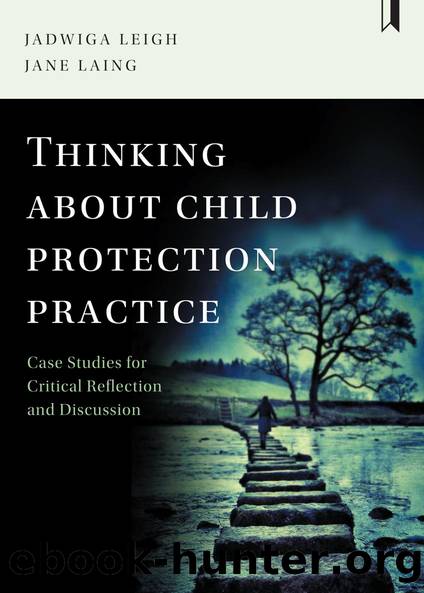Thinking about Child Protection Practice by Leigh Jadwiga Laing Jane

Author:Leigh, Jadwiga, Laing, Jane [Leigh, Jadwiga, Laing, Jane]
Language: eng
Format: epub
ISBN: 9781447332824
Barnesnoble:
Publisher: Policy Press
Published: 2018-01-31T00:00:00+00:00
Summary
When we consider the notion of âpowerâ we often split the context into two oppositional groups â âthe powerfulâ and âthe powerlessâ (Fook, 2012, p 57). An understanding of power inequalities in the workplace needs to be explored if we are to examine how this situation could have been handled differently by all involved.
First of all, it is clear that the situation could have been handled differently if the team manager and the senior managers had been properly aware of and subsequently duly followed the correct policy. If this had happened, then Kenny would have been informed in advance of his supervision what his meeting was going to address. He would have had the time to have sought support from a colleague or his Union representative. He would also have been provided with the reason for the meeting, and further details relating to why there were particular concerns about his practice could have been relayed. Kenny would have seen the notes relating to the case in question and he would have had the opportunity to respond to these appropriately.
If the appropriate procedure had been followed correctly, then perhaps the hasty and unexpected removal of Kenny, which took place in front of his team, would not have been deemed necessary. This action also contradicted with the procedure that recommends that such situations be handled respectfully. A calm and informed departure would have been less dramatic and perhaps prevented feelings of uncertainty and apprehension to escalate within the team and later, the department. Social workers who witness these kinds of situations may feel let down by their organisation because those they rely on to lead the service effectively donât always behave as practitioners would hope or expect them to. By taking a critically reflexive approach to organisational functioning, social workers can become aware of the hidden influences of assumptions that emanate from such cultural contexts.
Fook (2012, p 167) refers to this form of critical thinking as âcontextual competenceâ, which means having the ability to read the cultural climate of contexts and then being able to practice effectively with and within this climate. Attending to these aspects of practice can help explain why organisational changes are sometimes unsuccessful, and why alternative approaches to the barriers encountered in the workplace are sometimes required (Ruch and Murray, 2011). This doesnât mean that social workers should adapt to a âtoxicâ culture and thus perform in oppressive ways; rather, they should pause and consider why people are behaving in the way that they are, and then contemplate how their own behaviour is affecting the cultural context within which they are situated.
In this situation, it is evident that I wasnât contextually competent. It was a while before I realised that what I needed to do was to read the in-house disciplinary and grievance policy. Once I did, I became informed about how the situation should have been handled and I felt more aware of what needed to happen next. I was able to inform Kenny of what his
Download
This site does not store any files on its server. We only index and link to content provided by other sites. Please contact the content providers to delete copyright contents if any and email us, we'll remove relevant links or contents immediately.
Cecilia; Or, Memoirs of an Heiress — Volume 1 by Fanny Burney(32538)
Cecilia; Or, Memoirs of an Heiress — Volume 2 by Fanny Burney(31935)
Cecilia; Or, Memoirs of an Heiress — Volume 3 by Fanny Burney(31925)
The Great Music City by Andrea Baker(31911)
We're Going to Need More Wine by Gabrielle Union(19032)
All the Missing Girls by Megan Miranda(15925)
Pimp by Iceberg Slim(14476)
Bombshells: Glamour Girls of a Lifetime by Sullivan Steve(14046)
For the Love of Europe by Rick Steves(13869)
Talking to Strangers by Malcolm Gladwell(13341)
Norse Mythology by Gaiman Neil(13332)
Fifty Shades Freed by E L James(13228)
Mindhunter: Inside the FBI's Elite Serial Crime Unit by John E. Douglas & Mark Olshaker(9313)
Crazy Rich Asians by Kevin Kwan(9271)
The Lost Art of Listening by Michael P. Nichols(7487)
Enlightenment Now: The Case for Reason, Science, Humanism, and Progress by Steven Pinker(7303)
The Four Agreements by Don Miguel Ruiz(6739)
Bad Blood by John Carreyrou(6609)
Weapons of Math Destruction by Cathy O'Neil(6260)
